Marshall Hodgson. Rethinking World History: Essays on Europe, Islam and World History
Подождите немного. Документ загружается.

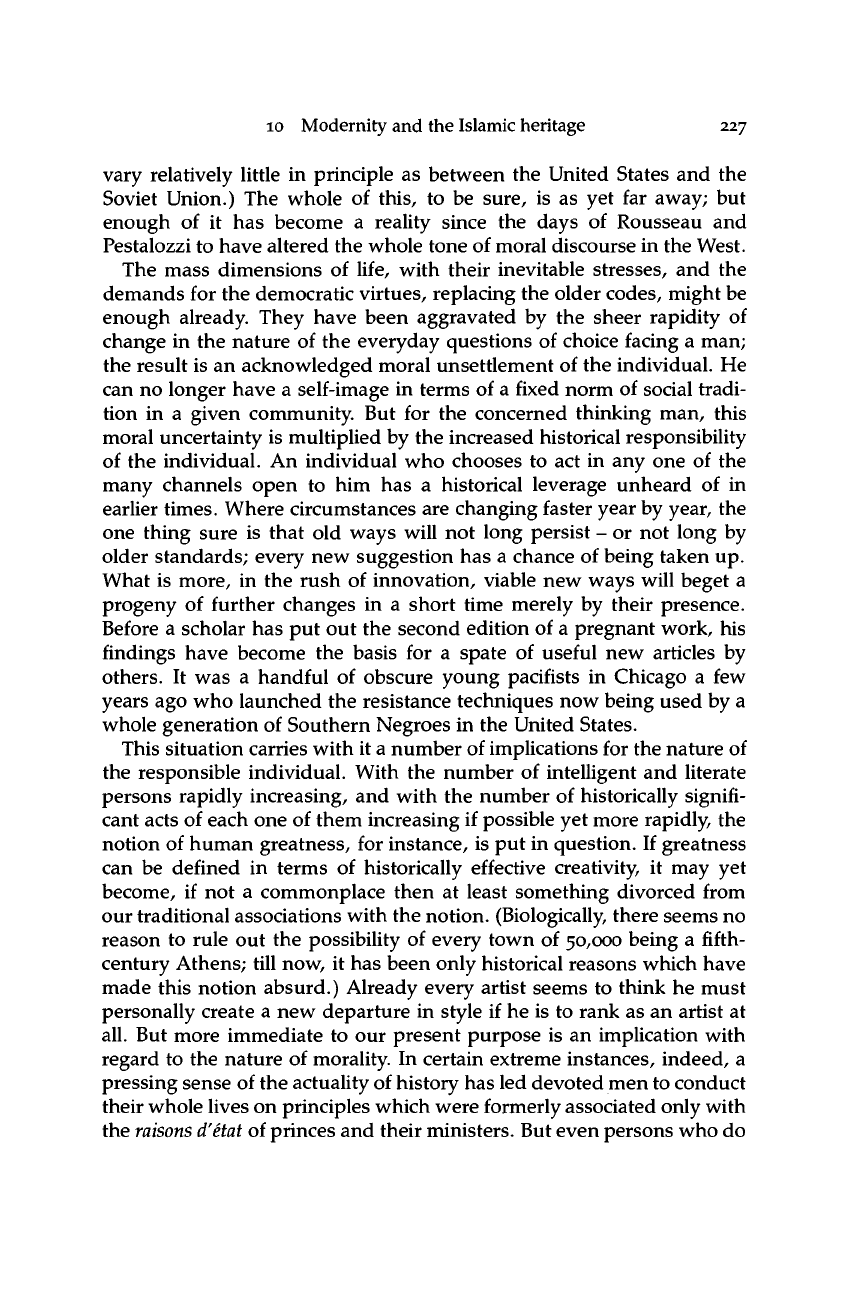
io Modernity and the Islamic heritage 227
vary relatively little in principle as between the United States and the
Soviet Union.) The whole of this, to be sure, is as yet far away; but
enough of it has become a reality since the days of Rousseau and
Pestalozzi to have altered the whole tone of moral discourse in the West.
The mass dimensions of life, with their inevitable stresses, and the
demands for the democratic virtues, replacing the older codes, might be
enough already. They have been aggravated by the sheer rapidity of
change in the nature of the everyday questions of choice facing a man;
the result is an acknowledged moral unsettlement of the individual. He
can no longer have a self-image in terms of a fixed norm of social tradi-
tion in a given community. But for the concerned thinking man, this
moral uncertainty is multiplied by the increased historical responsibility
of the individual. An individual who chooses to act in any one of the
many channels open to him has a historical leverage unheard of in
earlier times. Where circumstances are changing faster year by year, the
one thing sure is that old ways will not long persist - or not long by
older standards; every new suggestion has a chance of being taken up.
What is more, in the rush of innovation, viable new ways will beget a
progeny of further changes in a short time merely by their presence.
Before a scholar has put out the second edition of a pregnant work, his
findings have become the basis for a spate of useful new articles by
others. It was a handful of obscure young pacifists in Chicago a few
years ago who launched the resistance techniques now being used by a
whole generation of Southern Negroes in the United States.
This situation carries with it a number of implications for the nature of
the responsible individual. With the number of intelligent and literate
persons rapidly increasing, and with the number of historically signifi-
cant acts of each one of them increasing if possible yet more rapidly, the
notion of human greatness, for instance, is put in question. If greatness
can be defined in terms of historically effective creativity, it may yet
become, if not a commonplace then at least something divorced from
our traditional associations with the notion. (Biologically, there seems no
reason to rule out the possibility of every town of 50,000 being a fifth-
century Athens; till now, it has been only historical reasons which have
made this notion absurd.) Already every artist seems to think he must
personally create a new departure in style if he is to rank as an artist at
all.
But more immediate to our present purpose is an implication with
regard to the nature of morality. In certain extreme instances, indeed, a
pressing sense of the actuality of history has led devoted men to conduct
their whole lives on principles which were formerly associated only with
the
raisons
d'etat
of princes and their ministers. But even persons who do
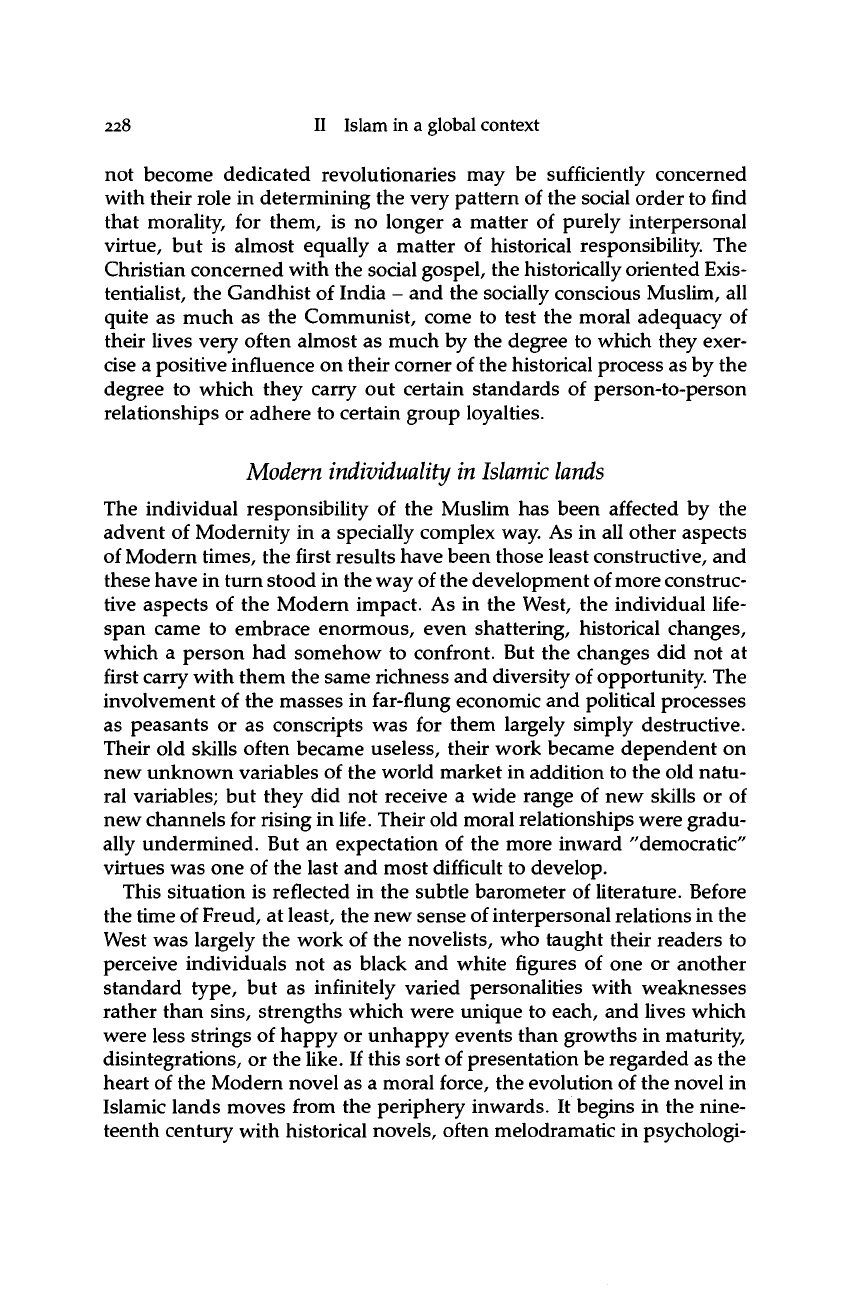
228 II Islam in a global context
not become dedicated revolutionaries
may be
sufficiently concerned
with their role
in
determining
the
very pattern
of
the social order
to
find
that morality,
for
them,
is no
longer
a
matter
of
purely interpersonal
virtue,
but is
almost equally
a
matter
of
historical responsibility.
The
Christian concerned with
the
social gospel, the historically oriented Exis-
tentialist,
the
Gandhist
of
India
- and the
socially conscious Muslim,
all
quite
as
much
as the
Communist, come
to
test
the
moral adequacy
of
their lives very often almost
as
much
by the
degree
to
which they exer-
cise
a
positive influence
on
their corner
of
the historical process as
by the
degree
to
which they carry
out
certain standards
of
person-to-person
relationships
or
adhere
to
certain group loyalties.
Modern individuality
in
Islamic
lands
The individual responsibility
of the
Muslim
has
been affected
by the
advent
of
Modernity
in a
specially complex way.
As in all
other aspects
of Modern times,
the
first results have been those least constructive,
and
these have
in
turn stood
in
the way
of
the development of more construc-
tive aspects
of the
Modern impact.
As in the
West,
the
individual life-
span came
to
embrace enormous, even shattering, historical changes,
which
a
person
had
somehow
to
confront.
But the
changes
did not at
first carry with them
the
same richness
and
diversity
of
opportunity.
The
involvement
of the
masses
in
far-flung economic
and
political processes
as peasants
or as
conscripts
was for
them largely simply destructive.
Their
old
skills often became useless, their work became dependent
on
new unknown variables
of
the world market
in
addition
to the old
natu-
ral variables;
but
they
did not
receive
a
wide range
of new
skills
or of
new channels
for
rising
in
life. Their old moral relationships were gradu-
ally undermined.
But an
expectation
of the
more inward "democratic"
virtues
was one of the
last
and
most difficult
to
develop.
This situation
is
reflected
in the
subtle barometer
of
literature. Before
the time
of
Freud,
at
least, the new sense
of
interpersonal relations
in the
West
was
largely
the
work
of the
novelists,
who
taught their readers
to
perceive individuals
not as
black
and
white figures
of one or
another
standard type,
but as
infinitely varied personalities with weaknesses
rather than sins, strengths which were unique
to
each,
and
lives which
were less strings
of
happy
or
unhappy events than growths
in
maturity,
disintegrations,
or
the like.
If
this sort
of
presentation be regarded
as the
heart
of
the Modern novel
as a
moral force,
the
evolution
of
the novel
in
Islamic lands moves from
the
periphery inwards.
It
begins
in the
nine-
teenth century with historical novels, often melodramatic
in
psychologi-
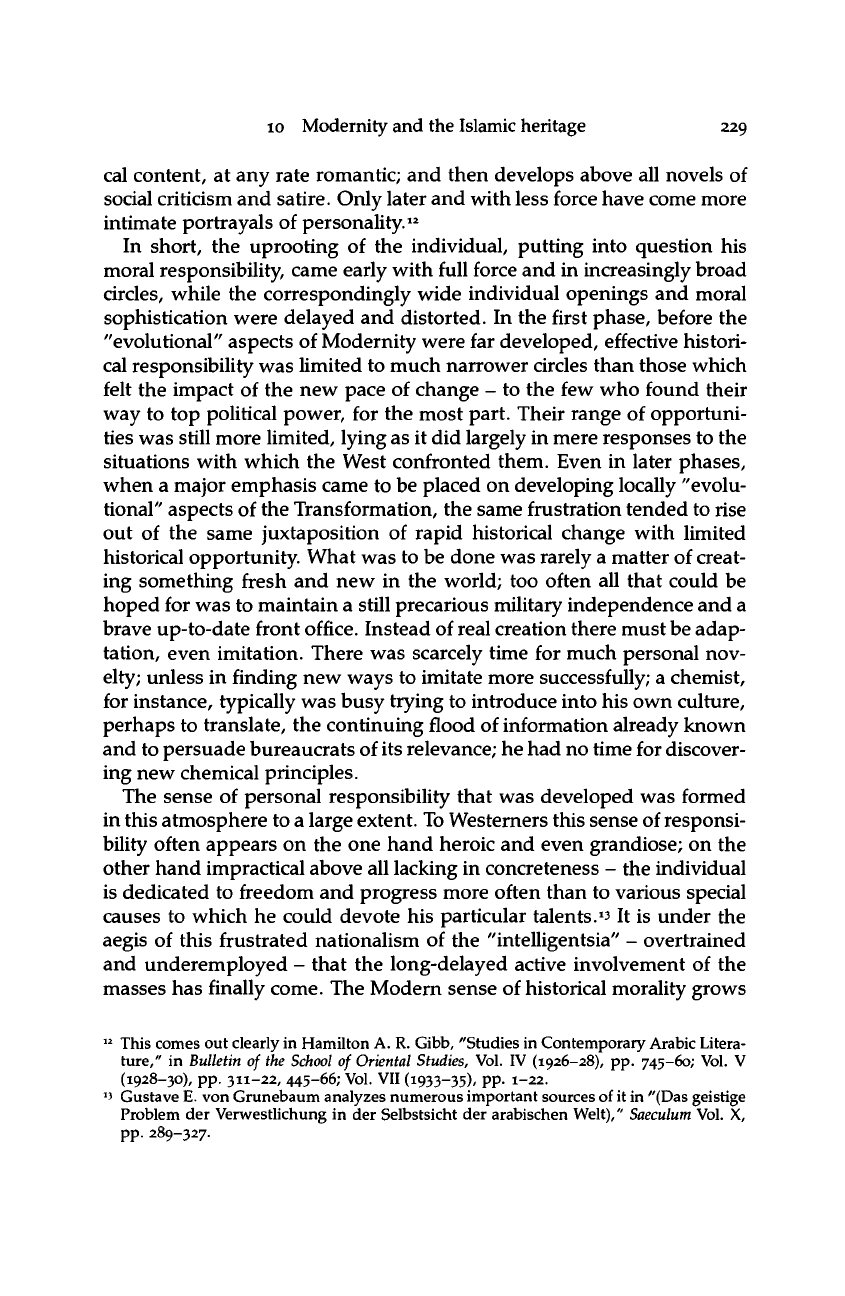
io Modernity and the Islamic heritage 229
cal content, at any rate romantic; and then develops above all novels of
social criticism and satire. Only later and with less force have come more
intimate portrayals of personality.
12
In short, the uprooting of the individual, putting into question his
moral responsibility, came early with full force and in increasingly broad
circles, while the correspondingly wide individual openings and moral
sophistication were delayed and distorted. In the first phase, before the
"evolutional" aspects of Modernity were far developed, effective histori-
cal responsibility was limited to much narrower circles than those which
felt the impact of the new pace of change - to the few who found their
way to top political power, for the most part. Their range of opportuni-
ties was still more limited, lying as it did largely in mere responses to the
situations with which the West confronted them. Even in later phases,
when a major emphasis came to be placed on developing locally "evolu-
tional" aspects of the Transformation, the same frustration tended to rise
out of the same juxtaposition of rapid historical change with limited
historical opportunity. What was to be done was rarely a matter of creat-
ing something fresh and new in the world; too often all that could be
hoped for was to maintain a still precarious military independence and a
brave up-to-date front office. Instead of real creation there must be adap-
tation, even imitation. There was scarcely time for much personal nov-
elty; unless in finding new ways to imitate more successfully; a chemist,
for instance, typically was busy trying to introduce into his own culture,
perhaps to translate, the continuing flood of information already known
and to persuade bureaucrats of its relevance; he had no time for discover-
ing new chemical principles.
The sense of personal responsibility that was developed was formed
in this atmosphere to a large extent.
To
Westerners this sense of responsi-
bility often appears on the one hand heroic and even grandiose; on the
other hand impractical above all lacking in concreteness - the individual
is dedicated to freedom and progress more often than to various special
causes to which he could devote his particular talents.^ It is under the
aegis of this frustrated nationalism of the "intelligentsia" - overtrained
and underemployed - that the long-delayed active involvement of the
masses has finally come. The Modern sense of historical morality grows
12
This comes out clearly in Hamilton A. R. Gibb, "Studies in Contemporary Arabic Litera-
ture/'
in Bulletin of the
School
of Oriental Studies, Vol. IV (1926-28), pp. 745-60; Vol. V
(1928-30), pp. 311-22, 445-66; Vol. VII (1933-35), PP- 1-22.
X
3 Gustave
E.
von Grunebaum analyzes numerous important sources of it in "(Das geistige
Problem der Verwestlichung in der Selbstsicht der arabischen Welt)/'
Saeculum
Vol. X,
pp.
289-327.

230 II Islam in a global context
as insistently among concerned Muslims as it has in the West. But
among the Muslims the background is not the rational enthusiasm of the
eighteenth century and the pious dreams of Horatio Alger success sto-
ries;
it is rather a frustrating intensity of feeling to which the form Moder-
nity first took there has inexorably led.
The dilemma of discontinuity
between
the
Islamic heritage
and Modernity
Now all this has obviously important implications for such fields as
politics, religion, education, or art. But I must limit myself to one point,
though that is a fairly large one: the relation of the individual to the
cultural heritage of the classical civilization he is supposed to be heir to.
This is especially relevant to the concerned individual, for it is the basis
from which he must work. But the point is historically crucial also. If the
Great Modern Transformation was a massive event, a change of histori-
cal pace and of the historical presuppositions of five thousand years, to
which we are all still responding in our various ways, there is no reason
to suppose that any pattern of response yet developed must be the final
one.
The future is still open. And crucial to any response must be its
attitude to the pre-Modern heritages which the Transformation has put
in question.
It is evident that the faster the pace of historical change, the more
problematical the survival of any particular concrete heritage - it be-
comes increasingly dependent on school-curriculum planning, on con-
scious radio-planning, and the like. But the full potential scope of the
problem has, I think, been masked in the West by the fact that technical
Modernity grew up within Occidental cultural forms; there has never
been any one given sharp break - not even, really, at the French Revolu-
tion; and indeed many forms which Modernity still takes reach back to
the Medieval Western life
ways.
When the problem is analyzed in the
Muslim case, these modifications of it fall away, and it takes on a sharper
air.
It has been questioned whether the Islamic heritage can survive at all,
unless in the form of a certain local color - rudimentary sets of supersti-
tions,
children's games (the child's imagination seems to reproduce past
points of his society's development anyway), and, at the least, special
holiday gala to attract tourists. This is not to say that currently there is
not still much that is distinctive of Islamic societies as such, even apart
from religious ritual; in many areas the peasantry, while in some ways
their lives have been sadly disarrayed by the economic advent of Moder-
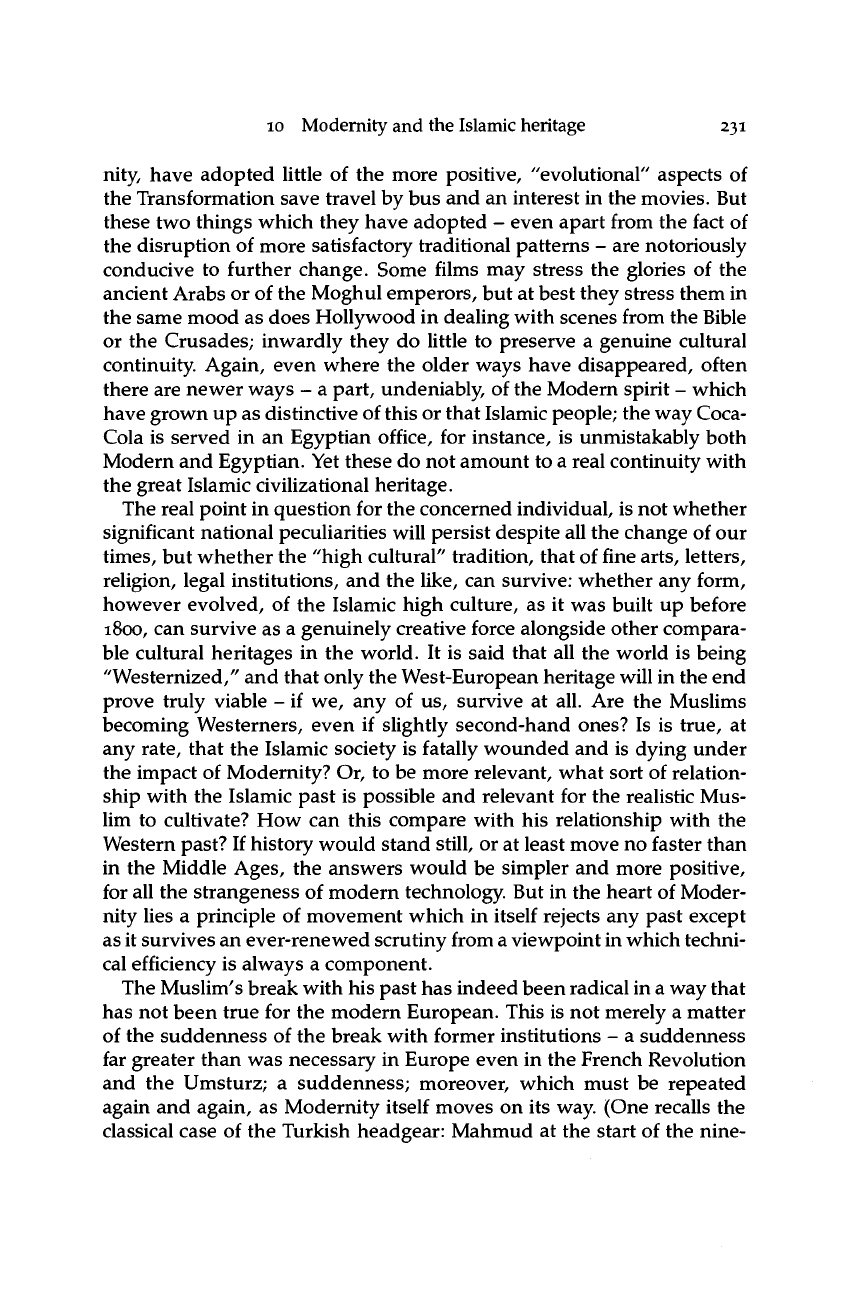
io Modernity and the Islamic heritage 231
nity, have adopted little of the more positive, "evolutional" aspects of
the Transformation save travel by bus and an interest in the movies. But
these two things which they have adopted - even apart from the fact of
the disruption of more satisfactory traditional patterns - are notoriously
conducive to further change. Some films may stress the glories of the
ancient Arabs or of the Moghul emperors, but at best they stress them in
the same mood as does Hollywood in dealing with scenes from the Bible
or the Crusades; inwardly they do little to preserve a genuine cultural
continuity. Again, even where the older ways have disappeared, often
there are newer ways - a part, undeniably, of the Modern spirit - which
have grown up as distinctive of this or that Islamic people; the way Coca-
Cola is served in an Egyptian office, for instance, is unmistakably both
Modern and Egyptian. Yet these do not amount to a real continuity with
the great Islamic civilizational heritage.
The real point in question for the concerned individual, is not whether
significant national peculiarities will persist despite all the change of our
times,
but whether the "high cultural" tradition, that of fine arts, letters,
religion, legal institutions, and the like, can survive: whether any form,
however evolved, of the Islamic high culture, as it was built up before
1800,
can survive as a genuinely creative force alongside other compara-
ble cultural heritages in the world. It is said that all the world is being
"Westernized," and that only the West-European heritage will in the end
prove truly viable - if we, any of us, survive at all. Are the Muslims
becoming Westerners, even if slightly second-hand ones? Is is true, at
any rate, that the Islamic society is fatally wounded and is dying under
the impact of Modernity? Or, to be more relevant, what sort of relation-
ship with the Islamic past is possible and relevant for the realistic Mus-
lim to cultivate? How can this compare with his relationship with the
Western past? If history would stand still, or at least move no faster than
in the Middle Ages, the answers would be simpler and more positive,
for all the strangeness of modern technology. But in the heart of Moder-
nity lies a principle of movement which in itself rejects any past except
as it survives an ever-renewed scrutiny from a viewpoint in which techni-
cal efficiency is always a component.
The Muslim's break with his past has indeed been radical in a way that
has not been true for the modern European. This is not merely a matter
of the suddenness of the break with former institutions - a suddenness
far greater than was necessary in Europe even in the French Revolution
and the Umsturz; a suddenness; moreover, which must be repeated
again and again, as Modernity itself moves on its way. (One recalls the
classical case of the Turkish headgear: Mahmud at the start of the nine-

232 II Islam in a global context
teenth century imposed
the fez as a
modern headgear
to
identify
all
Ottoman subjects regardless
of
creed,
and met
with bitter opposition;
a
century later, Ataturk raised even greater resistance when,
to
assure
the
triumph
of a
latter-day republicanism,
he
replaced
the
now-accustomed
fez with
the
brimmed hat).
It is
further
a
matter
of
the cultural tendency
of the
new
ways.
Often the change has meant not strictly Modernization, that
is,
change
of
the
same sort
as
that which transformed
the
West
itself, but
actual
Westernization
in a
regional-cultural sense. Superficially, this
may
enter
as a matter
of
mere convenience, though it by no means always does.
The
adoption
of
Latin letters (rather than
a
reform
of
Arabic ones)
as a
means
of streamlining
the
press,
the use of the
men's suit-coat
-
certainly
no
product
of a
time-and-motion-study mentality
- as a
means
of
toning
down personal display, these things handily reflect Modern ways of oper-
ating;
but
they make use
of
old Western elements, which originally were
only accidentally associated with primacy
of
technical considerations
or
any other aspect
of
Modernity proper. With care, such superficial West-
ernization can
be
avoided.
But even more subtly,
an
old-Western element enters into most basic
efforts
at
Modernization, however zealously kept free
of
direct affiliation
with Occidental communities.
For,
naturally enough,
the
main institu-
tions
of
Modernity are colored deeply by the cultural forms
of
the society
in which they were first produced. With
an
effort
of the
imagination,
one
can
guess what the institutions
of
Modernity might have been like if
it had developed,
for
instance,
in
Islamic society, say in the 23rd and 24th
centuries, instead
of in the
West-European.
For one
thing, industrial
society would probably
not
have been cast
in the
form
of the
nation-
state.
The
nation-state, with
its
constitutionalism,
its
particularist char-
ters
of
rights
and
responsibilities, stems from
the
corporate conceptions
of Medieval Western society. From the very different legal conceptions of
Medieval Islamic society, with their abstract egalitarian universalism,
there might well have developed, instead
of
the nation-state, some inter-
national corps
of
super-ulama, regulating
an
industrial society
on the
basis
of
some super-sharia code. Such institutions, while demanding
a
break
for
Islam
as
radical
as
that which
the
West went through
in mod-
ernizing, would yet have preserved some continuity of
basic
presupposi-
tions.
In
fact,
it has
instead been
the
Western form
of
Modernity into
which the Islamic peoples have had to enter, articulating themselves into
nation-states which, however Modern, also inescapably
do
embody
old
Occidental attitudes.
The
presuppositions
of an
industrial nation-state,
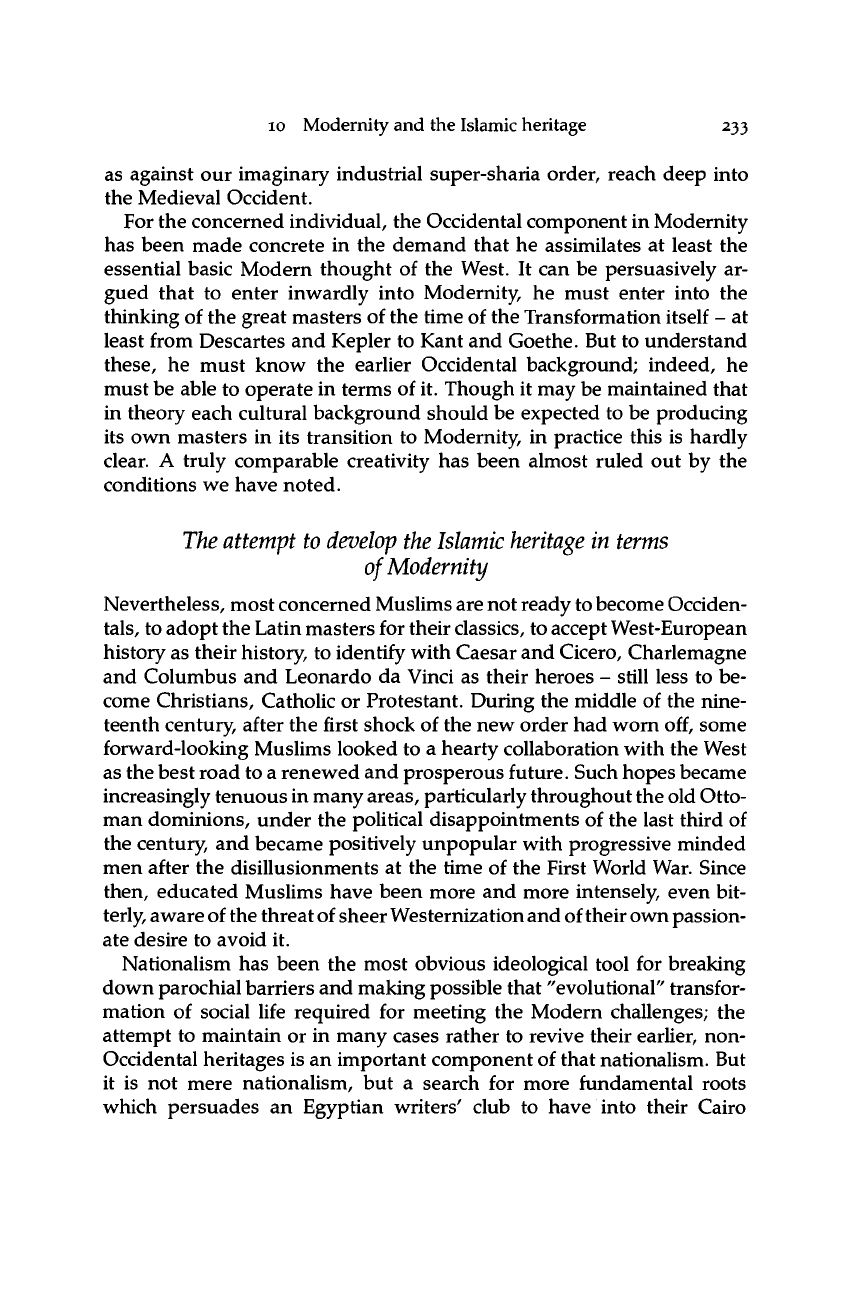
io Modernity and the Islamic heritage 233
as against our imaginary industrial super-sharia order, reach deep into
the Medieval Occident.
For the concerned individual, the Occidental component in Modernity
has been made concrete in the demand that he assimilates at least the
essential basic Modern thought of the West. It can be persuasively ar-
gued that to enter inwardly into Modernity, he must enter into the
thinking of the great masters of the time of the Transformation itself - at
least from Descartes and Kepler to Kant and Goethe. But to understand
these, he must know the earlier Occidental background; indeed, he
must be able to operate in terms of it. Though it may be maintained that
in theory each cultural background should be expected to be producing
its own masters in its transition to Modernity, in practice this is hardly
clear. A truly comparable creativity has been almost ruled out by the
conditions we have noted.
The attempt to
develop
the
Islamic heritage
in terms
of Modernity
Nevertheless, most concerned Muslims are not ready to become Occiden-
tals,
to adopt the Latin masters for their
classics,
to accept West-European
history as their history, to identify with Caesar and Cicero, Charlemagne
and Columbus and Leonardo da Vinci as their heroes - still less to be-
come Christians, Catholic or Protestant. During the middle of the nine-
teenth century, after the first shock of the new order had worn off, some
forward-looking Muslims looked to a hearty collaboration with the West
as the best road to a renewed and prosperous future. Such hopes became
increasingly tenuous in many
areas,
particularly throughout the old Otto-
man dominions, under the political disappointments of the last third of
the century, and became positively unpopular with progressive minded
men after the disillusionments at the time of the First World War. Since
then, educated Muslims have been more and more intensely, even bit-
terly, aware of the threat of sheer Westernization and of their own passion-
ate desire to avoid it.
Nationalism has been the most obvious ideological tool for breaking
down parochial barriers and making possible that "evolutional" transfor-
mation of social life required for meeting the Modern challenges; the
attempt to maintain or in many cases rather to revive their earlier, non-
Occidental heritages is an important component of that nationalism. But
it is not mere nationalism, but a search for more fundamental roots
which persuades an Egyptian writers' club to have into their Cairo
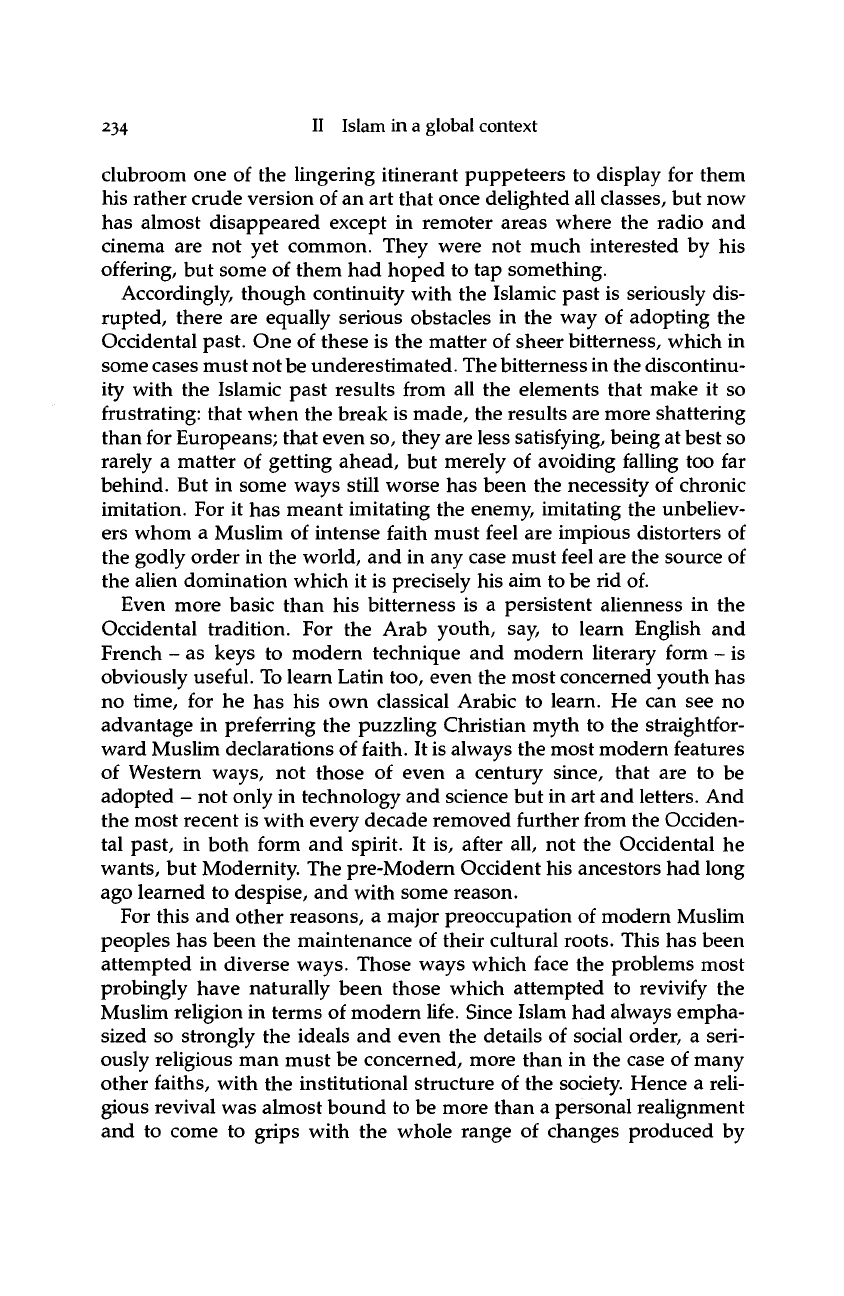
234 II Islam in a global context
clubroom one of the lingering itinerant puppeteers to display for them
his rather crude version of an art that once delighted all classes, but now
has almost disappeared except in remoter areas where the radio and
cinema are not yet common. They were not much interested by his
offering, but some of them had hoped to tap something.
Accordingly, though continuity with the Islamic past is seriously dis-
rupted, there are equally serious obstacles in the way of adopting the
Occidental past. One of these is the matter of sheer bitterness, which in
some cases must not be underestimated. The bitterness in the discontinu-
ity with the Islamic past results from all the elements that make it so
frustrating: that when the break is made, the results are more shattering
than for Europeans; that even so, they are less satisfying, being at best so
rarely a matter of getting ahead, but merely of avoiding falling too far
behind. But in some ways still worse has been the necessity of chronic
imitation. For it has meant imitating the enemy, imitating the unbeliev-
ers whom a Muslim of intense faith must feel are impious distorters of
the godly order in the world, and in any case must feel are the source of
the alien domination which it is precisely his aim to be rid of.
Even more basic than his bitterness is a persistent alienness in the
Occidental tradition. For the Arab youth, say, to learn English and
French - as keys to modern technique and modern literary form - is
obviously useful. To learn Latin too, even the most concerned youth has
no time, for he has his own classical Arabic to learn. He can see no
advantage in preferring the puzzling Christian myth to the straightfor-
ward Muslim declarations of faith. It is always the most modern features
of Western ways, not those of even a century since, that are to be
adopted - not only in technology and science but in art and letters. And
the most recent is with every decade removed further from the Occiden-
tal past, in both form and spirit. It is, after all, not the Occidental he
wants,
but Modernity. The pre-Modern Occident his ancestors had long
ago learned to despise, and with some reason.
For this and other reasons, a major preoccupation of modern Muslim
peoples has been the maintenance of their cultural roots. This has been
attempted in diverse ways. Those ways which face the problems most
probingly have naturally been those which attempted to revivify the
Muslim religion in terms of modern life. Since Islam had always empha-
sized so strongly the ideals and even the details of social order, a seri-
ously religious man must be concerned, more than in the case of many
other faiths, with the institutional structure of the society. Hence a reli-
gious revival was almost bound to be more than a personal realignment
and to come to grips with the whole range of changes produced by
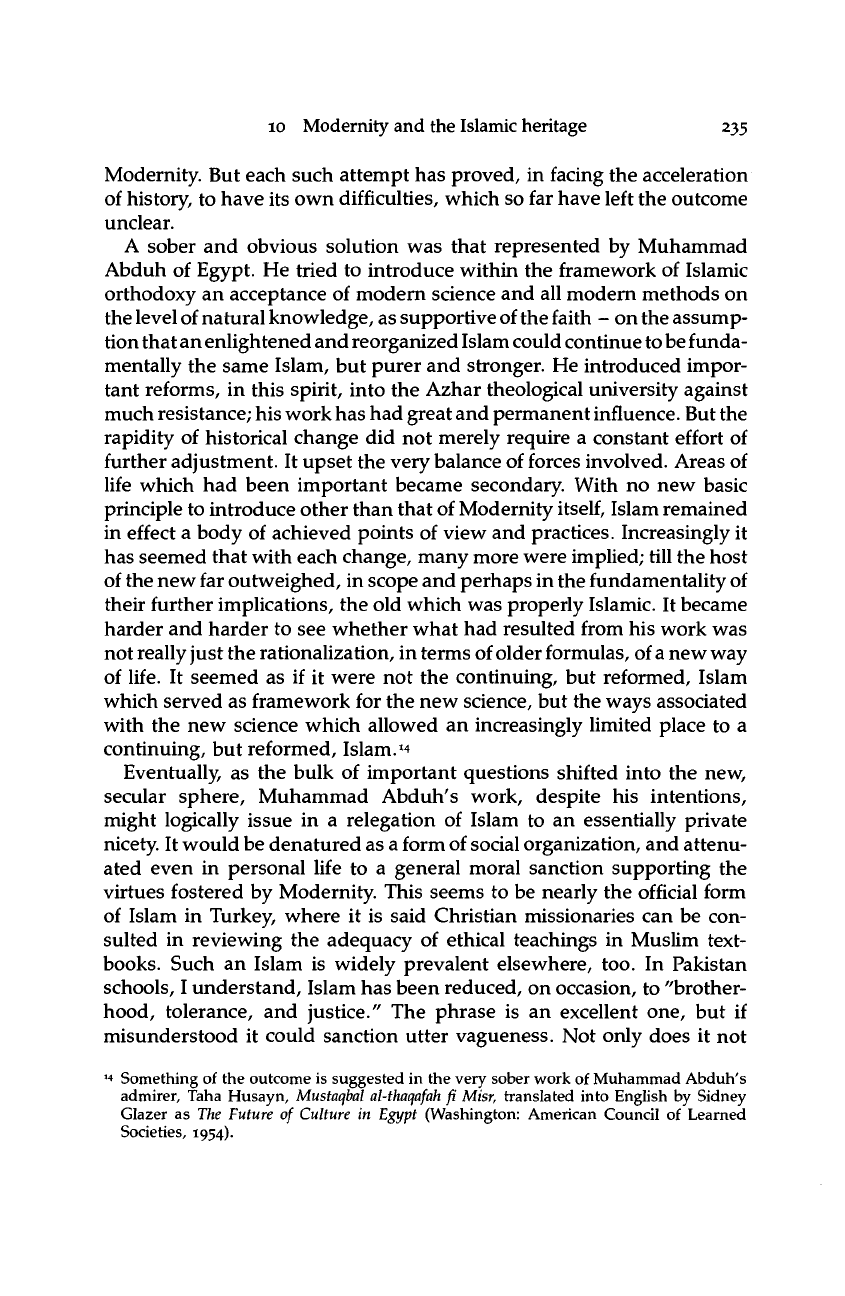
io Modernity and the Islamic heritage 235
Modernity. But each such attempt has proved, in facing the acceleration
of history, to have its own difficulties, which so far have left the outcome
unclear.
A sober and obvious solution was that represented by Muhammad
Abduh of Egypt. He tried to introduce within the framework of Islamic
orthodoxy an acceptance of modern science and all modern methods on
the level of natural knowledge, as supportive of the faith - on the assump-
tion that an enlightened and reorganized Islam could continue to be funda-
mentally the same Islam, but purer and stronger. He introduced impor-
tant reforms, in this spirit, into the Azhar theological university against
much resistance; his work has had great and permanent influence. But the
rapidity of historical change did not merely require a constant effort of
further adjustment. It upset the very balance of forces involved. Areas of
life which had been important became secondary. With no new basic
principle to introduce other than that of Modernity
itself,
Islam remained
in effect a body of achieved points of view and practices. Increasingly it
has seemed that with each change, many more were implied; till the host
of the new far outweighed, in scope and perhaps in the fundamentality of
their further implications, the old which was properly Islamic. It became
harder and harder to see whether what had resulted from his work was
not really just the rationalization, in terms of older formulas, of a new way
of life. It seemed as if it were not the continuing, but reformed, Islam
which served as framework for the new science, but the ways associated
with the new science which allowed an increasingly limited place to a
continuing, but reformed, Islam.*4
Eventually, as the bulk of important questions shifted into the new,
secular sphere, Muhammad Abduh's work, despite his intentions,
might logically issue in a relegation of Islam to an essentially private
nicety. It would be denatured as a form of social organization, and attenu-
ated even in personal life to a general moral sanction supporting the
virtues fostered by Modernity. This seems to be nearly the official form
of Islam in Turkey, where it is said Christian missionaries can be con-
sulted in reviewing the adequacy of ethical teachings in Muslim text-
books. Such an Islam is widely prevalent elsewhere, too. In Pakistan
schools, I understand, Islam has been reduced, on occasion, to "brother-
hood, tolerance, and justice." The phrase is an excellent one, but if
misunderstood it could sanction utter vagueness. Not only does it not
*4 Something of the outcome is suggested in the very sober work of Muhammad Abduh
7
s
admirer, Taha Husayn,
Mustaqbal al-thaqafah
fi
Misr,
translated into English by Sidney
Glazer as The Future of
Culture
in Egypt (Washington: American Council of Learned
Societies, 1954).
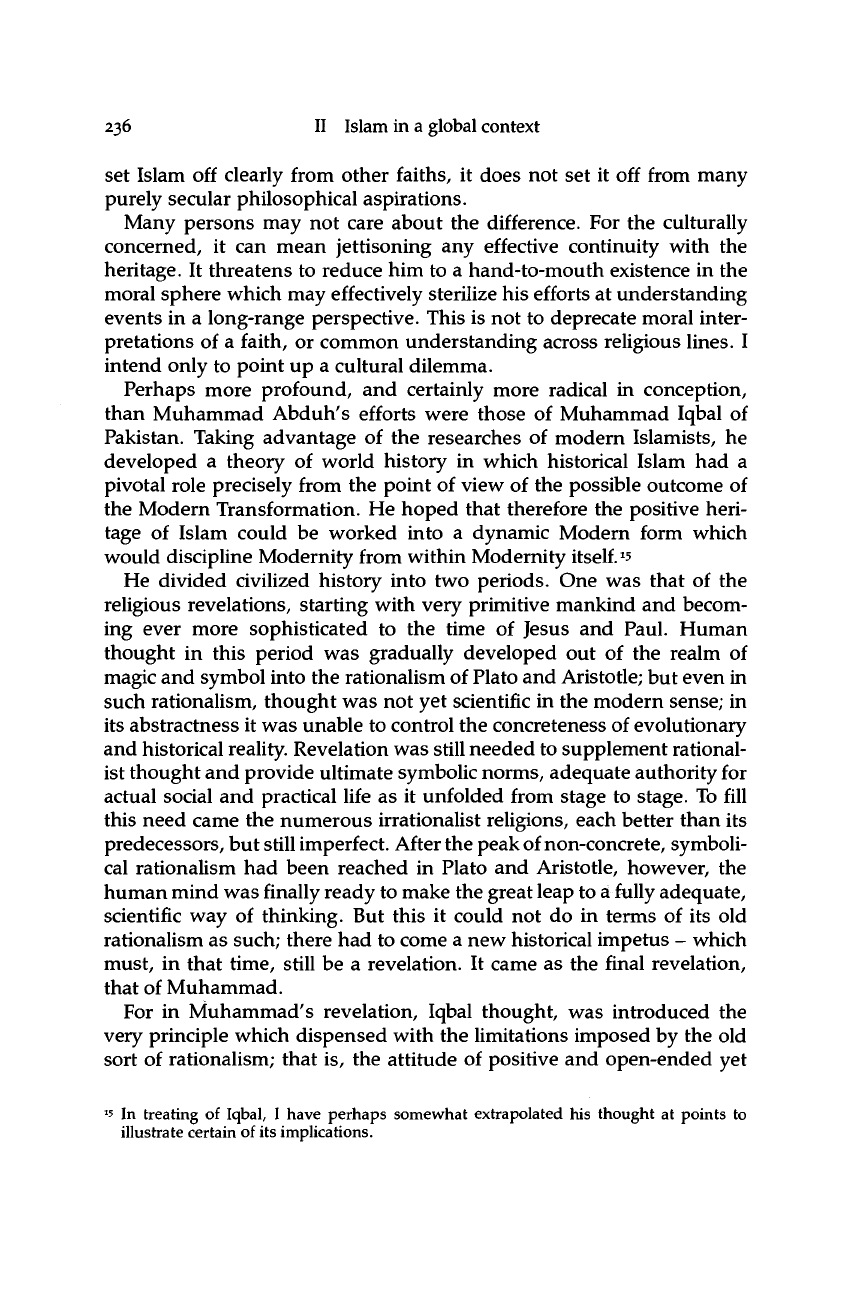
236 II Islam in a global context
set Islam off clearly from other faiths, it does not set it off from many
purely secular philosophical aspirations.
Many persons may not care about the difference. For the culturally
concerned, it can mean jettisoning any effective continuity with the
heritage. It threatens to reduce him to a hand-to-mouth existence in the
moral sphere which may effectively sterilize his efforts at understanding
events in a long-range perspective. This is not to deprecate moral inter-
pretations of a faith, or common understanding across religious lines. I
intend only to point up a cultural dilemma.
Perhaps more profound, and certainly more radical in conception,
than Muhammad Abduh's efforts were those of Muhammad Iqbal of
Pakistan. Taking advantage of the researches of modern Islamists, he
developed a theory of world history in which historical Islam had a
pivotal role precisely from the point of view of the possible outcome of
the Modern Transformation. He hoped that therefore the positive heri-
tage of Islam could be worked into a dynamic Modern form which
would discipline Modernity from within Modernity
itself.
^
He divided civilized history into two periods. One was that of the
religious revelations, starting with very primitive mankind and becom-
ing ever more sophisticated to the time of Jesus and Paul. Human
thought in this period was gradually developed out of the realm of
magic and symbol into the rationalism of Plato and Aristotle; but even in
such rationalism, thought was not yet scientific in the modern sense; in
its abstractness it was unable to control the concreteness of evolutionary
and historical reality. Revelation was still needed to supplement rational-
ist thought and provide ultimate symbolic norms, adequate authority for
actual social and practical life as it unfolded from stage to stage. To fill
this need came the numerous irrationalist religions, each better than its
predecessors, but still imperfect. After the peak of non-concrete, symboli-
cal rationalism had been reached in Plato and Aristotle, however, the
human mind was finally ready to make the great leap to a fully adequate,
scientific way of thinking. But this it could not do in terms of its old
rationalism as such; there had to come a new historical impetus - which
must, in that time, still be a revelation. It came as the final revelation,
that of Muhammad.
For in Muhammad's revelation, Iqbal thought, was introduced the
very principle which dispensed with the limitations imposed by the old
sort of rationalism; that is, the attitude of positive and open-ended yet
*s In treating of Iqbal, I have perhaps somewhat extrapolated his thought at points to
illustrate certain of its implications.
